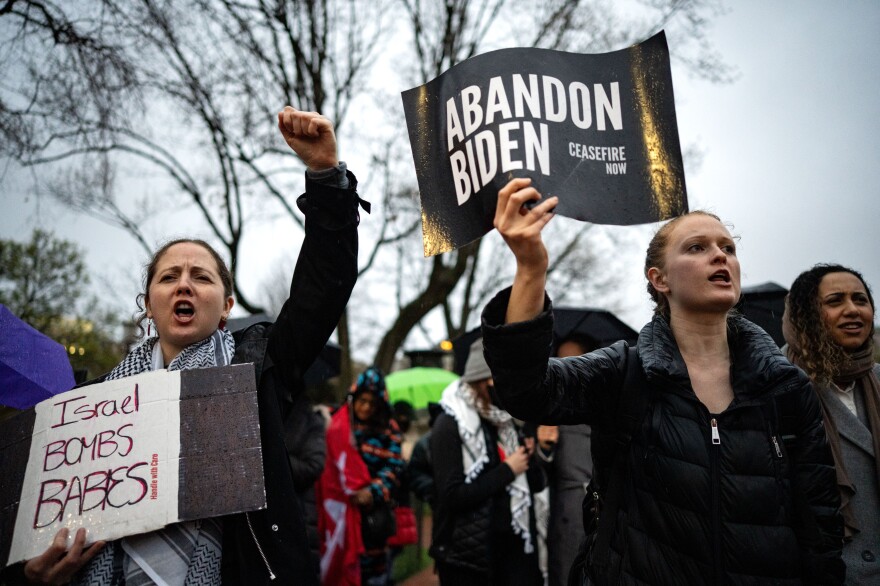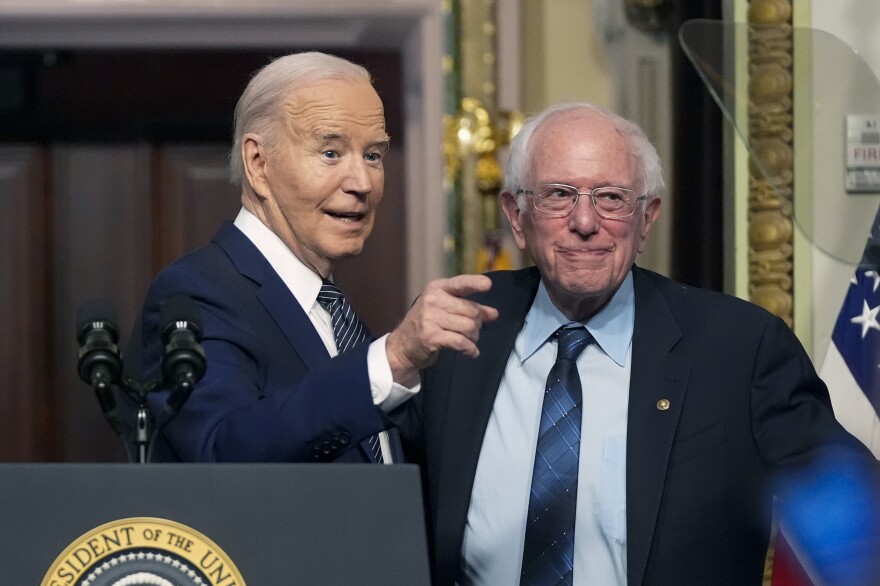Four years ago this week, Vermont Sen. Bernie Sanders ended his second bid for the White House, effectively cementing Joe Biden's path to the Democratic presidential nomination.
Sanders threw his support behind Biden. And unlike past displays of party unity after a primary fight, Biden and Sanders took a unique step to collaborate on a handful of policy-focused task forces in the hope of finding common ground between the candidates' coalitions.
Over the course of several months, the task forces produced a 110-page document focused on topics like the economy and climate, and Biden went on to incorporate a number of the recommendations into his campaign platform and first-term agenda.
The partnership between Biden and Sanders helped deliver the Vermont senator's supporters, including young voters, into Biden's camp.
Four years later, Sanders still backs Biden. The two appeared together recently in a video posted on the Biden campaign's TikTok account.
But as Biden seeks a second term with low approval ratings, he faces a new struggle to win over young voters who were crucial to his first election. And as an incumbent with no high-profile primary opponent to join forces with, a similar unity moment like the 2020 task forces may not be an option.
To Sanders' chief political adviser, Faiz Shakir, part of the difference now is that Biden has to answer to his own record.
"He owns the policy direction in a way that in 2020 he didn't," Shakir said. "He was offering policy directions and saying, 'Put me into office.' Now he owns the Middle East policy, Ukraine policy, migrant policy. There's an assumption, expectation, that Joe Biden has to deliver on different policy outcomes that particularly young people would like to see."
And many young people don't like what they see. According to the latest NPR/PBS NewsHour/Marist poll, among voters under 30, 6 in 10 disapprove of Biden's job as president, the highest of any age group.
But Shakir remains hopeful that the president can rally a voter coalition similar to what he had four years ago, partially because of Biden's ability to absorb critical feedback.
"What has been a consistent thread of Joe Biden's life as a politician, he's in some sense not like Bernie Sanders, who I think has appropriately and stubbornly held certain positions and has been right about them," Shakir said. "Biden is authentic in that he's always indicated: I will move on my positions, on certain ones, if you can show me that the center or that the majority, that the movement is in a different place."
Looking back at a unique partnership
Sanders entered the 2020 primary with strong support among young voters.
"He spoke to young people and their importance on a regular basis," said Shana Gallagher, Sanders' national student organizing director, in 2020. "And that is actually very rare for candidates to do, especially in a consistent, genuine way."
Over two presidential campaigns in 2016 and 2020, Sanders rose in popularity among many young voters by backing key progressive issues, including a push for universal health care and significant increases in government spending to combat climate change.
When Cristóbal Alex thinks back to April 2020, he recalls the value of Sanders' endorsement.
"It was a very important one, maybe the most important ever," said Alex, who served as a senior adviser to the Biden campaign and sat on the immigration-focused policy task force.
"Bernie played a huge role in bringing young folks over," he added.
Carmel Martin was a senior policy adviser to Biden's 2020 campaign and coordinated the task forces.
"It was a way that we could send a signal to the people who were supporting Sen. Sanders," Martin said. "That what they cared about mattered to President Biden as well."
Allies of both the president and Sanders point to policies implemented throughout Biden's first term that can be linked back to the task forces — including major investments in climate change prevention and infrastructure and attempts to relieve billions in student debt — wins that Biden now touts on the campaign trail again.
4 years later, Biden holds on to those partnerships
Sanders has continued to work with Biden throughout his first term, including holding private meetings over issue messaging.
To the Biden campaign, a second term is about building on the work started four years ago. Because of that, they argue there isn't necessarily a need for another prominent coming-together moment that echoes the task forces.
"We're already part of a coalition," said Rep. Maxwell Frost, D-Fla., a Biden campaign surrogate. "So we don't have to fight our way in. We just have to continue making our voices heard. And the president is still listening to us."
Despite initially supporting and working for Sanders in the 2020 primary, Frost, who is the first Gen Z member of the U.S. House, has been pushing young voters to give Biden another chance.
"I think progressives have always had a knack for being able to communicate to voters across party lines and help inspire disaffected voters," Frost said. "And I think whether it's Bernie [Sanders] or myself or many progressives, we still have something to give in terms of helping to influence the messaging, and not just the messaging but the action that backs up the messaging in this election so people can turn out."
Divides remain among Democratic voters

But while many progressives like Frost and Sanders campaign for Biden, it's unclear how many of the policy wins they tout have resonated with younger voters. Just 1 in 10 voters under 30 say Biden's policies have helped them personally, according to a recent poll by The New York Times and Siena College.
Instead, Biden is battling lower enthusiasm to vote compared with four years ago, as well as doubts over his age. And he's faced pressure from many younger voters to demand a permanent cease-fire and stop additional aid to Israel in its war in Gaza — as the death toll climbs past 33,000, according to Gaza's health ministry.
Despite his past popularity among progressives, Sanders is not entirely in lockstep with the left wing of the party on the issue. In the initial months after the Hamas attack on Oct. 7 that killed 1,200 people, according to Israel, Sanders received pushback from progressives, including previous campaign staff, for refusing to call for a cease-fire.
The Vermont senator has acknowledged that the president's position on Israel could cost him votes, particularly from young voters and nonwhite voters.
Biden's public posture on the war has changed. He now supports a temporary cease-fire and is more critical of Israel's continued military campaign.
But he's yet to go to the extent many progressives want.
When thinking about avenues to mend some of today's divisions, alums of the Sanders 2020 campaign draw back on Biden's willingness to collaborate four years ago.
"Joe Biden is undeniably a politically astute leader," said Analilia Mejia, Sanders' 2020 political director. "Now, that doesn't mean perfection, but that means understanding where people are and understanding when there is a need to shift."
Mejia, who coordinated the task forces for the Sanders side, argued that watching Biden begin to shift his position on U.S. involvement in the Israel war is a testament to his political skill.
Shakir says Sanders is now urging Biden to lay out a second-term progressive agenda, and that Sanders has a frank pitch for Biden moving forward: Acknowledge problems and explain how they're being addressed.
"Even on the issues where there's the most division," Shakir said, referencing the war in Gaza. "You don't have to mask it. Be honest with them. And it's the reason why we have to continue in this direction because the other choice would certainly set us backwards."
The Biden campaign has six months to boost the youth vote. According to the latest NPR/PBS NewsHour/Marist poll, a third of Gen Z and millennial voters have a good idea who they'll vote for but could still switch, and 17% have not made a decision.
And when Shakir thinks about why young voters aren't on board yet, there's a simple answer. "They're not done pushing him," he explained. "And to his credit, Joe Biden's always indicated, yeah, keep pushing me."
Copyright 2024 NPR. To see more, visit https://www.npr.org.









